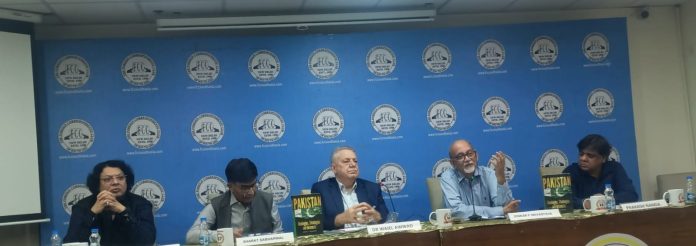– Mohd.Naushad Khan
New Delhi – Veteran diplomat D. P. Shrivastava, former Ambassador to Iran, launched his new book Pakistan – Ideologies, Strategies and Interests at the Foreign Correspondents’ Club on Thursday evening. The book is a deeply researched study of Pakistan’s political and ideological journey.
Introducing the book, Shrivastava said it does not discuss Partition history or India-Pakistan relations in detail. Instead, it focuses on the ideological foundation of Pakistan, its military strategies, and the political interests shaping the state since 1947. He said Pakistan has seen coups, constitutional changes, and upheavals. But ideology has remained constant.
This ideology, he explained, is different from Western political thought. It combines faith, historical memory, and expediency. It predates the two-nation theory, survived Partition, and still drives statecraft. Shrivastava said ideology has no constitutional definition. Yet, it appears in judicial rulings, political actions, and state policies.
He cited the 1972 Supreme Court verdict upholding Zulfikar Ali Bhutto’s dismissal of two provincial governments “against the ideology of Pakistan.” This, he said, proved ideology stands above constitutional law. The book traces contributions of Sir Syed Ahmed Khan, Allama Iqbal, Muhammad Ali Jinnah, and Abul A’la Maududi. Sir Syed stressed Muslim distinctiveness. Iqbal rejected territorial nationalism to preserve Islamic unity. Jinnah shifted between communal separation and secular promises. Maududi’s Jamaat-e-Islami, despite opposing Partition, embedded itself into Pakistan’s politics.
Shrivastava called the Objectives Resolution of 1949 a turning point. It subordinated people’s sovereignty to divine sovereignty. This marginalized minorities and brought religion into governance. Zia-ul-Haq’s amendments further elevated ideology over fundamental rights. He argued rejection of democracy, plurality, and linguistic identity caused crises. Jinnah’s insistence on Urdu alienated Bengalis, leading to Bangladesh.
Shrivastava said the military became the “custodian of ideology.” Pakistan framed wars in religious terms. In 1947 Kashmir invasion, officers used names of Muslim conquerors. Nuclear weapons were linked with Islamic identity, branded “modern weapons of terror.” Terrorism and jihad became state tools. The Afghan jihad deepened this. Pakistan used jihadists as regional instruments and to counter Pashtun nationalism. After 9/11, Pakistan took U.S. aid but covertly supported the Taliban.
He said the Kashmir dispute reflects ideological obsession. Pakistan bases its claim on the two-nation theory while ignoring Kashmiri aspirations. He pointed to contradictions. The state calls TTP and Baloch rebels “outside Islam,” yet they accuse rulers of hypocrisy. Leaders like Imran Khan, invoking Riyasat-e-Medina, show religion still defines politics.
Shrivastava stressed that Jinnah and the Muslim League did not represent all Indian Muslims. Maulana Azad, Badshah Khan, and Maulana Madani upheld composite nationalism with Quranic arguments. They rejected the two-nation theory. Their voices were sidelined but remain important to understand South Asia’s divisions.
He concluded that Pakistan’s path is shaped less by rational strategy and more by ideology as state principle. This fuels military dominance, radicalization, and instability. Today, Pakistan faces a triangular contest among the Army, TTP, and populist forces like Imran Khan. Each seeks legitimacy through religion.
At the launch, Dr. Waiel S. H. Awwad, President of FCC, challenged the idea of ideology as a basis for states. He called it a “dangerous mistake.” He said ideological states fail. Citing history, he noted Britain under Henry VIII and Netanyahu’s Israel. On Pakistan, he recalled its Defense Minister admitting the country was “rented” to the U.S. for Afghan jihad. He said this was far from true Islamic values. If jihad were genuine, he argued, it would be in Palestine, not through Taliban. He concluded Partition was not about ideology but colonial “divide and rule.” Hindus and Muslims had fought the British together.
Former diplomat Sharat Sabharwal also spoke. He praised the book as an important scholarly work. Recalling Partition, he said Pakistan soon defined itself against India. This bred instability. He listed four dysfunctions: civil-military imbalance, extremism, reliance on foreign powers, and ethnic-sectarian divides. These, he said, keep Pakistan “troubled and troublesome.” He added Pakistan’s terrorism and blocking of regional connectivity hurt itself and its neighbors. He lauded Shrivastava’s first-hand Karachi experience and deep research. He said the book shows how opportunism, ideology, and strategy shaped Pakistan.
The event ended with a lively discussion. The book was hailed as a valuable addition to South Asian studies.




